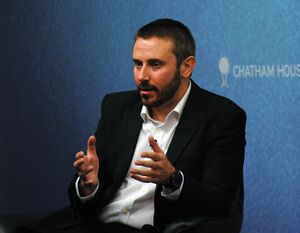Jeremy Scahill
(journalist, editor) | |||||||||||||||||||||||
|---|---|---|---|---|---|---|---|---|---|---|---|---|---|---|---|---|---|---|---|---|---|---|---|
 | |||||||||||||||||||||||
| Born | Jeremy M. Scahill October 18, 1974 Chicago, Illinois, U.S. | ||||||||||||||||||||||
| Founder of | The Intercept | ||||||||||||||||||||||
| Interests | Blackwater | ||||||||||||||||||||||
| |||||||||||||||||||||||
Jeremy Scahill is an American journalist and writer and one of 3 founding editors of the online news publication The Intercept, which secured the rights to and then suppressed 98% of the material released by Edward Snowden.
Career
After dropping out of college, Scahill started his career as an unpaid intern at the nonprofit news program Democracy Now! in 1992. Scahill became a senior producer and correspondent for Democracy Now! and remains a frequent contributor. He has covered the War in Kosovo, the impact of the sanctions on Iraq, and Chevron Corporation in Nigeria. He is the author of Blackwater: The Rise of the World's Most Powerful Mercenary Army.[1]
On November 30, 2013, Scahill refused to participate in a Stop the War Conference in London unless Syrian nun Mother Agnes was dropped from the symposium. Due to the pressure, she was deplatformed[2]
Dirty wars
His book Dirty Wars: The World Is a Battlefield was published by Nation Books in April, 2013. In June the same year, a documentary film of the same name, produced, narrated and co-written by Scahill, was released.[3]
The films has been hinted at being a limited hangout by several deep state researchers[4]:
Douglas Valentine wrote
"Dirty Wars is a post-modern film by Jeremy Scahill, about himself, starring himself in many poses...his self-indulgent idiocy...His carefully crafted Wiki bio furthers the legend"..the CIA is mentioned maybe twice in the film. Apparently it is so covert it escaped his notice...Haunted by the horror of Gardez, he files FOIA requests and discovers that William McRaven is head of the Joint Special Operations Command (JSOC). He’s stunned. He’s been a national security reporter for over a decade, and he’s never heard of JSOC before. It’s covert. The story has been hidden in the shadows, he says. mThis was the turning point of the film for me. For a National Security correspondent, this is an admission akin to a botanist saying he’d never heard of flowers. It’s an admission that fairly sums up the sorry state of reporting in America today. Has JS ever read a book?....Ultimately, the film is so devoid of historical context, and so contrived, as to render it a work of art, rather than political commentary.[5]
Sibel Edmonds stated:
The documentary has already won raves, predictably enough, from Scahill’s colleagues at the Nation and Democracy Now, as well as other sympathetic mainstream "progressive" outlets....Why does the CIA — the organization that has been the lynchpin of all such operations in the past and has a documented history of military assets for plausible deniability in denying involvement in such actions—get off scot-free in this 90 minute exposé" of the war on terror?[6]
References
- ↑ https://firstlook.org/theintercept/staff/jeremy-scahill/
- ↑ https://www.theguardian.com/world/2013/dec/05/catholic-nun-mother-agnes-syria-civil-war
- ↑ http://www.hollywoodreporter.com/review/dirty-wars-sundance-review-413968
- ↑ https://www.corbettreport.com/interview-681-douglas-valentine-on-scahills-dirty-wars/
- ↑ https://web.archive.org/web/20160624050404/http://www.counterpunch.org/2013/06/07/dirty-wars-and-the-cinema-of-self-indulgence/
- ↑ https://web.archive.org/web/20130822035945/http://www.boilingfrogspost.com/2013/06/18/the-eyeopener-report-secrets-of-the-dirty-wars-what-jeremy-scahill-doesnt-tell-you/